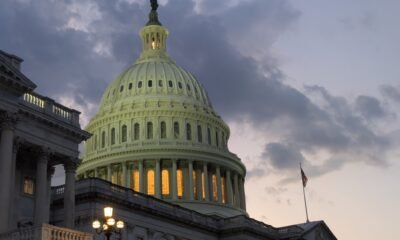#azgov
GOP Tax Cut Bill Hits a Wall as Freedom Caucus Fights $3.4 Trillion Deficit Surge

This report has been updated.
WASHINGTON — U.S. House Republicans faced significant hurdles in advancing their extensive bill on Wednesday. After over seven hours of waiting, leaders called for a procedural vote that stalled due to resistance from hard-right members.
The House must approve the rule to initiate debate on a tax break and spending cut package. However, the situation remained unresolved as four Republicans voted against it and nine refrained, leaving the House in a standstill around 11 p.m. Eastern.
Opposition emerged from GOP Representatives Andrew Clyde (GA), Brian Fitzpatrick (PA), Keith Self (TX), and Victoria Spartz (IN). Freedom Caucus Chairman Andy Harris (MD) withheld his vote in protest.
Many far-right House members disapproved of a Senate version passed earlier, which featured modifications over the previous month. The House Freedom Caucus opposed specific immigration provisions and a repeal of clean energy tax credits, as well as the bill’s projected increase in deficits.
The nonpartisan Congressional Budget Office assessed that the legislation would amplify deficits by $3.4 trillion over the next decade compared to current laws.
Speaker Mike Johnson from Louisiana expressed optimism during negotiations but acknowledged the difficulty of securing necessary votes. “Legislation of this magnitude involves diverse priorities,” he stated. “We can’t make everyone 100% happy.”
Rep. Dusty Johnson from South Dakota echoed this sentiment, emphasizing the adverse impact if the rule fails. He expressed confidence in Speaker Johnson’s ability to persuade holdouts, potentially by promising future legislative commitments.
Rep. Chip Roy from Texas noted earlier that some members were “exploring all options” as they challenged aspects of the Senate’s proposal. “We’re unhappy with the last-minute handling of this bill,” he remarked.
President Trump engaged with House GOP lawmakers at the White House, attempting to rally support. He expressed confidence via social media just before the vote, urging unity within the Republican caucus for significant tax cuts.
House Rules Chairwoman Virginia Foxx insisted on approving the rule, framing it as essential to fulfill campaign promises tied to the America First agenda. She declared, “Failure at this juncture is not an option.”
Conversely, Massachusetts Democratic Rep. Jim McGovern criticized the rushed process surrounding the amended 870-page package. “This process is legislative malpractice,” he asserted, highlighting the limited time for debate and numerous last-minute changes.
The bill aims to expand tax benefits while fundamentally altering key safety-net programs and reducing Medicaid funding. Tax cuts primarily benefit higher income earners, with significant disparities highlighted by the Center on Budget and Policy Priorities.
Enhancements to Medicaid provisions include mandatory work requirements for some recipients, and a year-long freeze on Planned Parenthood funding. Additionally, new stipulations regarding the Supplemental Nutrition Assistance Program (SNAP) would shift some payment responsibilities to state governments.
Protests occurred outside the U.S. Capitol, with demonstrators voicing concerns about proposed cuts to Medicaid and SNAP, alongside rollbacks to clean energy tax credits.
In the Senate, a razor-thin margin characterized the vote, with Maine’s Susan Collins and Kentucky’s Rand Paul among the dissenting Republicans. Collins cited concerns regarding Medicaid impacts, while Paul expressed apprehension over the bill’s deficit implications.
As tensions within the GOP escalate, the future of this legislation remains uncertain, with ongoing negotiations and dissenting voices complicating the path ahead.


















